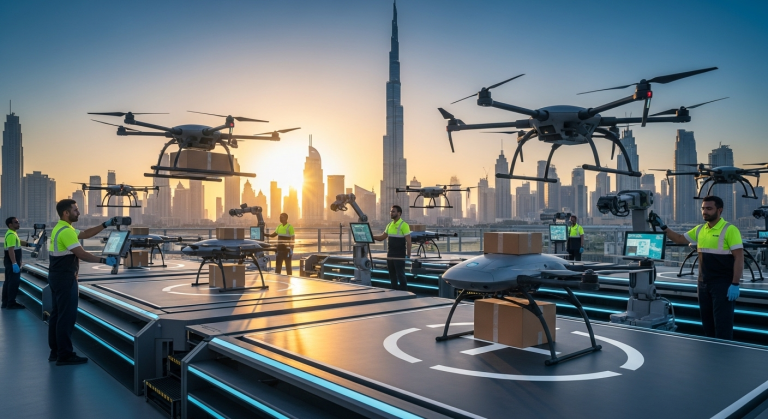Market Analysis and Opportunities
The drone delivery service for small packages is gaining traction globally, with the United Arab Emirates (UAE)—and particularly Dubai—positioned as an early adopter due to its pro-innovation environment and robust logistics landscape. Businesses and investors closely monitor trends in the UAE market, seeking emerging opportunities that harmonize with Dubai’s future-ready infrastructure and digital transformation agenda.
Target Market Analysis
Dubai’s economy is marked by rapid urbanization, high smartphone penetration, and a burgeoning e-commerce ecosystem. According to a Statista report, the UAE’s e-commerce market is expected to reach over $9.2 billion by 2026, with last-mile delivery representing a major growth driver. The demand for faster, safer, and more reliable delivery services—particularly for small packages (under 5kg)—is surging among millennials and tech-savvy residents. Sectors primed for drone delivery include:
- Retail and e-commerce platforms seeking to offer rapid, same-day delivery
- Healthcare providers requiring swift transfer of prescription medicines and medical samples
- Food delivery services looking to minimize urban congestion delays
Drone delivery is further propelled by the UAE’s Smart Government initiatives, high disposable income, and a population known for early technology adoption. Market estimates suggest an average compound annual growth rate (CAGR) of 13% for the Middle East’s drone delivery sector from 2024 to 2030, with Dubai leading in pilot projects and regulatory openness.
Consumer Preferences and Industry Trends
Consumers in Dubai exhibit strong preferences for speed, reliability, and contactless service—attributes ideally matched by drone delivery. The shift toward sustainability, intensified by national mandates like UAE Vision 2030, has also increased appetite for green logistics solutions. Key industry trends shaping the Dubai scene include:
- Digital transformation via automation, AI, and data-driven logistics
- Sustainability as a differentiator—zero-emission delivery modes are in demand
- Integration with smart city infrastructure, IoT, and cloud services
Marketing Needs
For successful market entry, robust marketing is essential. Tactics tailored to Dubai’s competitive landscape include:
- Comprehensive market research to identify high-potential customer segments, partnership opportunities, and regulatory developments
- SEO-optimized digital campaigns—e.g., Google Ads, localized social media targeting expatriate and local communities, and influencer partnerships
- Branding strategies focused on safety, reliability, and environmental responsibility
Traditional advertising (e.g., billboards, industry events) can supplement digital efforts to reinforce credibility.
Expansion Potential
Dubai is the ideal launchpad for scaling across the UAE and GCC. Opportunities for growth include:
- Expansion into logistics support for B2B sectors (medical supplies, construction parts)
- Diversification into residential and rural delivery, addressing underserved communities
- Broader regional entry, leveraging Dubai’s status as a logistics and trade hub
Comprehensive Business Overview
Serving as an early adopter of smart logistics, the drone delivery service for small packages targets fast-growing segments—e-commerce, healthcare, food delivery, and essential goods distribution. The business model primarily centers around:
- Per-delivery fees or subscription-based logistics for B2B partners
- On-demand service for consumers, leveraging a mobile application
- Partnerships with retail and logistics companies to extend reach
Mission, Vision, and Core Objectives
Mission: To revolutionize last-mile delivery in the UAE, offering rapid, eco-friendly, and contactless drone-based logistics for small packages.
Vision: To be the leading drone delivery service in the Gulf, setting standards for innovation, reliability, and sustainability.
Objectives:
- Deploy a scalable and compliant drone delivery network in key UAE cities, starting with Dubai
- Forge strategic alliances with top e-commerce and healthcare brands
- Achieve operational excellence while maintaining high safety standards
Business Stage and Location
Most drone delivery ventures are at early-stage (startup/growth) phases in Dubai. Choosing the Dubai Free Zone (e.g., Dubai Silicon Oasis, Dubai South) offers strategic benefits such as simplified licensing, access to tech infrastructure, and full ownership for foreign investors.
Competitive Advantage
Entrepreneur Perspective
Drone delivery services present a timely opportunity for founders due to:
- First-mover advantage in a tech-forward, supportive regulatory environment
- High scalability through franchising or white-label solutions
- Proprietary technology—custom routing algorithms or drone fleet management software enhance operational efficiency
Investor Perspective
Investors seek high-growth, disruptor businesses, and this model offers:
- Attractive ROI—drone logistics reduce per-delivery costs by up to 40% (PwC Middle East 2023)
- Strong exit opportunities (acquisition by major logistics or tech players)
- Investment in compliance-driven markets reduces regulatory risk
- Clear scalability both within the UAE and across the wider GCC
Manager Perspective
Operational advantages include:
- Data-driven route optimization to cut operating costs
- Highly automated processes, lowering labor dependency
- Competitive partnerships with technology vendors or delivery platforms
Industry leaders like Emirates Post and Careem are already piloting UAV logistics, validating market readiness.
Financial and Investment Needs
Financial Requirements
Establishing a drone delivery operation in Dubai typically requires AED 2-5 million in initial capital, allocated as follows:
- Infrastructure (drones, maintenance, charging stations): AED 1.5–2 million
- Regulatory and licensing (GCAA, DED, Free Zone setup): AED 300,000–750,000
- Staffing and HR (technical, operations, compliance): AED 500,000 – 1 million
- R&D, software, and integrations: AED 500,000+
- Marketing and business development: AED 250,000–500,000
Investment Potential
With a projected market CAGR of over 10% in Dubai’s logistics sector, potential investors can expect strong growth and attractive returns. Preferred investment models include:
- Venture capital funding for rapid scaling and tech development
- Equity partnerships with logistics or telecom firms
- Angel investment in exchange for convertible notes
Financial Risks and Mitigation
Key risks:
- Cash flow strain due to high upfront R&D and regulatory processes
- Potential currency volatility
- Cost overruns from rapid tech evolution or regulatory changes
Mitigation strategies include:
- Diversified revenue streams (B2C plus B2B services)
- Comprehensive insurance (liability, theft, operational)
- Legal safeguards through robust contracts and compliance monitoring
Human Resources and Recruitment
Workforce Needs
A typical drone delivery startup in Dubai requires 20–40 employees, including:
- Drone pilots/operators (if not fully automated)
- Software developers (app, fleet management platform)
- Operations and logistics managers
- Compliance officers (aviation, data, local regulations)
- Marketing and sales teams
Specialized skills—UAV piloting, Python development, AI, and regulatory expertise—are crucial for success.
HR Challenges and Strategies
Attracting top talent in Dubai remains competitive due to high demand for tech professionals. Solutions include:
- Offering competitive compensation, healthcare, and end-of-service benefits
- Ongoing upskilling and certification programs (drone piloting, tech stack upgrades)
- Creating a dynamic, diverse work environment in line with Dubai’s multicultural ethos
Compliance with UAE Labor Laws
To stay compliant:
- Adhere to Ministry of Human Resources guidelines on contracts, work permits, and visas
- Provide legal contracts, medical coverage, and end-of-service gratuities
- Implement inclusive hiring practices and transparent grievance channels
Partnering with reputable HR consultancies or using residency and citizenship solutions ensures HR compliance and smooth onboarding of expatriate talent.
Infrastructure and Operations
Infrastructure Needs
Key infrastructure includes:
- Launch and landing pads (rooftop or mobile units in strategic districts)
- Drone fleet (procurement, maintenance, secure storage)
- Operations center or virtual office for monitoring and dispatch
- Cloud-based fleet and order management systems
Cost-effective options: Utilize Dubai Free Zones for reduced setup costs; consider co-working spaces for support teams.
Operational Optimization
Potential bottlenecks:
- Airspace management and regulatory approvals
- Integration with logistics partners for seamless handoff
- Software glitches or connectivity issues
Improvements:
- Adopt ERP or cloud-based management platforms for end-to-end automation
- Implement predictive maintenance on drones to minimize downtime
- Partner with logistics leaders (e.g., Aramex, Emirates Post) for best-practice sharing
Legal Compliance
To operate legally in Dubai:
- Register the company with appropriate Free Zone or Mainland authority
- Obtain all required permits (e.g., from General Civil Aviation Authority for drones)
- Maintain proper business bank accounts and financial disclosures
Engage a specialist in business setup in Dubai for streamlined registration and licensing.
Innovation and Technology
The sector is ripe for digitization:
- AI-powered route planning and fleet management
- Smart sensors for obstacle avoidance and package security
- Blockchain for delivery proof and traceability
- API integration with e-commerce and last-mile logistics platforms
Staying on the innovation curve is essential for differentiation in Dubai’s technology-driven environment.
Marketing and Branding Strategies
Brand Status
Establishing trust in a new delivery mode is critical. Current efforts should focus on:
- Highlighting safety records and reliability
- Building visual identity with eco-friendly, high-tech imagery
- Association with Dubai’s smart city ambitions
Further brand amplification is possible via industry awards, certification, and strategic endorsements.
Marketing Channels
Main channels:
- SEO-driven content marketing (case studies, safety protocols, customer success stories)
- Google Ads and localized PPC campaigns targeting Dubai residents and businesses
- Social media—Instagram, LinkedIn, Twitter—to showcase customer testimonials and pilot program results
Offline: Sponsorship of tech meetups, participation in logistics exhibitions, and partnerships with business councils.
360-Degree Campaigns
A holistic approach incorporates:
- Influencer-driven social campaigns (unboxing, delivery speed demos)
- Email nurture series for B2B partners and early technology adopters
- Onsite events or pilot demos in Dubai tech parks
- Coverage in tech and business media (see Persian Horizon News)
Growth and Development Potential
Growth Strategies
Scale progressively through:
- Micro-market launches (Dubai Marina, Downtown Dubai, Business Bay)
- Strategic partnerships with regional e-com leaders (Noon, Carrefour, Souq)
- Integration with health sector logistics to support rapid, critical deliveries
Networking
Leverage Dubai’s strong B2B networks by:
- Joining local business councils and smart city alliances
- Collaborating with Free Zone authorities for pilot projects
- Accessing international business support via the Persian Horizon network
International Potential
Dubai’s logistics and aviation reputation positions the business as a prototype for GCC-wide or global expansion. Gateway advantages include:
- Access to international trade networks via Jebel Ali Port and DXB
- Proximity to India, Africa, and Europe for export market development
- Testbed for innovation, which can drive adoption elsewhere
Sustainability and Innovation
Aligning with Dubai Vision 2030:
- Adopt renewable-powered drones and recyclable packaging
- Partner with green logistics initiatives
- Invest in R&D to reduce noise pollution and airspace impact
Alignment with Dubai’s Market
Cultural Alignment
Success depends on resonance with Dubai’s multicultural landscape. Key actions:
- Multilingual service support (Arabic, English, Hindi, Urdu)
- Customer service tailored to local and expatriate norms
- Inclusive marketing imagery and narratives
Local Regulatory Compliance
Ensure:
- Valid trade licenses and activity permits (aviation, logistics, tech)
- Up-to-date VAT registration and compliance with tax authority
- Adherence to labor and safety codes set by local regulators
Close monitoring and periodic consultation with compliance advisors are recommended.
Advantages of Dubai
The business leverages Dubai’s:
- Zero personal and corporate income tax for most businesses (especially in Free Zones)
- Access to world-class logistics, tech infrastructure, and highly skilled workforce
- Proactive support from government innovation programs (e.g., Dubai Future Accelerators)
Moreover, Dubai’s global connectivity makes it the ideal launchpad for logistics automation in the GCC and beyond.
Local Challenges and Solutions
Challenges include:
- Stringent regulatory process for drone usage
- High competition from established logistics firms
- Operational costs (tech, licenses, training)
Mitigation strategies:
- Early engagement with regulators for pilot approvals
- Clear cost modeling and budget control in early phases
- Differentiation through innovation, customer experience, and reliable partnerships
Conclusion
Drone delivery for small packages presents a compelling business opportunity in Dubai, driven by digitization, urbanization, and rising consumer expectations for instant, sustainable logistics. For entrepreneurs, entry now offers the coveted first-mover advantage. For investors, the sector promises scalable, high-return prospects and the benefits of Dubai’s investment-friendly climate. Managers can leverage advanced technology and robust infrastructure for efficient roll-out.
Key recommendations for success include:
- Strategic market entry via Free Zones and early regulatory compliance
- Investing in digital transformation and strong, visible branding
- Forming partnerships with leading logistics and retail firms
- Engaging talent through competitive packages and continuous upskilling
- Ongoing innovation in sustainability and operational excellence
- Leveraging consulting partners for market navigation—explore Persian Horizon’s investment consulting services for tailored support
Ultimately, Dubai’s pro-business climate, global ambitions, and openness to smart logistics position drone delivery as an irresistible proposition for modern investors and visionary founders alike.
Call to Action
If you are ready to unlock the next wave of business in Dubai or need expert support in setup, strategy, or investment, explore Persian Horizon’s services for comprehensive assistance. Stay up-to-date on opportunities and trends in the region via our Dubai business insights blog and discover how you can be part of Dubai’s smart logistics revolution.







